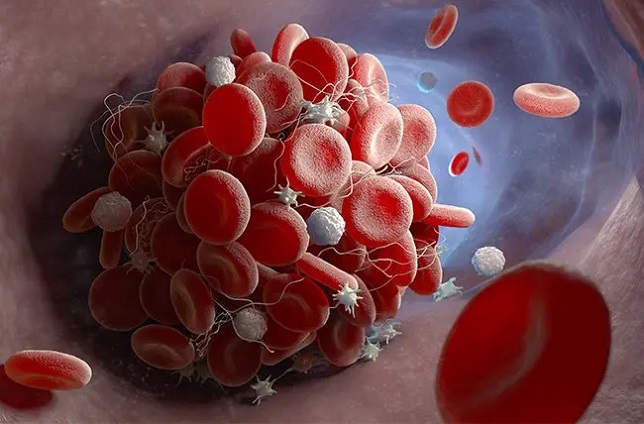Nikhil Prasad Fact checked by:Thailand Medical News Team Nov 18, 2025 3 months, 1 week, 2 hours, 54 minutes ago
Medical News: Researchers from the Department of Cardiothoracic Surgery at the John Radcliffe Hospital, Oxford University Hospital NHS Trust explain that COVID-19 has quietly changed the way blood behaves in millions of people. They warn that even those who had mild infections or vaccinations months or years earlier may still carry hidden clotting abnormalities that can dramatically affect outcomes during cardiac surgery. This
Medical News report summarizes their findings and highlights why these changes matter now.
 Experts warn that lingering post COVID clotting changes are now complicating heart surgery outcomes.
How COVID-19 Creates a Long-Term Clotting Shift
Experts warn that lingering post COVID clotting changes are now complicating heart surgery outcomes.
How COVID-19 Creates a Long-Term Clotting Shift
According to the review, COVID-19 can leave behind inflammation, blood vessel injury and abnormal clotting activity long after recovery. Many individuals continue to show elevated D-dimer, increased fibrinogen, platelet hyperactivity and persistent endothelial damage. These effects can last for months and may occur even without symptoms.
Vaccination can also create short surges in inflammation and clotting activity. When layered on top of previous infection, the body may remain in a subtly heightened clotting state without anyone realizing.
Why These Hidden Changes Become Dangerous in Heart Surgery
Heart surgery requires the use of a heart–lung machine. When blood runs through artificial tubing, it becomes inflamed and more prone to clotting. Patients who had COVID-19 or repeated vaccination may already have a “primed” system, meaning the bypass process triggers a stronger and more chaotic response.
The review notes increased cases of heparin resistance, unexpected clots forming inside bypass circuits and misleading clotting test results that do not match real anticoagulation levels. Low oxygen levels, elevated heparin-destroying enzymes, vaccine-related platelet activation and lingering endothelial injury all contribute to unpredictable bleeding and clotting problems during surgery.
New Strategies to Keep Patients Safe
The researchers highlight several solutions. Maintaining stronger oxygen delivery during surgery helps reduce hypoxia-linked clotting changes. Newer anticoagulants, such as factor XI inhibitors and drugs that block heparin-degrading enzymes, show promise for cases where standard heparin is unreliable.
They also emphasize updated monitoring: traditional ACT tests alone are no longer adequate. A combination of anti-Xa testing, viscoelastic assays like TEG or ROTEM and markers of endothelial damage provides a more accurate picture of the patient’s true clotting status.
Conclusions
The review makes clear that COVID-19 has permanently reshaped baseline clotting behavior in the global population. Many heart surgery patients now arrive with subtle but significant coagulation changes that are not detected by routine tests. Surgery teams must adapt with improved monitoring, more personalized anticoagulation strategies and new therapeutic options. The
long-lasting effects of COVID-19 and repeated vaccination mean that cardiac surgery must evolve to avoid preventable bleeding, clotting complications and bypass-circuit failures in the years ahead.
The study findings were published in the peer reviewed Journal of Clinical Medicine
https://www.mdpi.com/2077-0383/14/22/8109
For the latest COVID-19 News, keep on logging to Thailand
Medical News.
Read Also:
https://www.thailandmedical.news/articles/coronavirus
